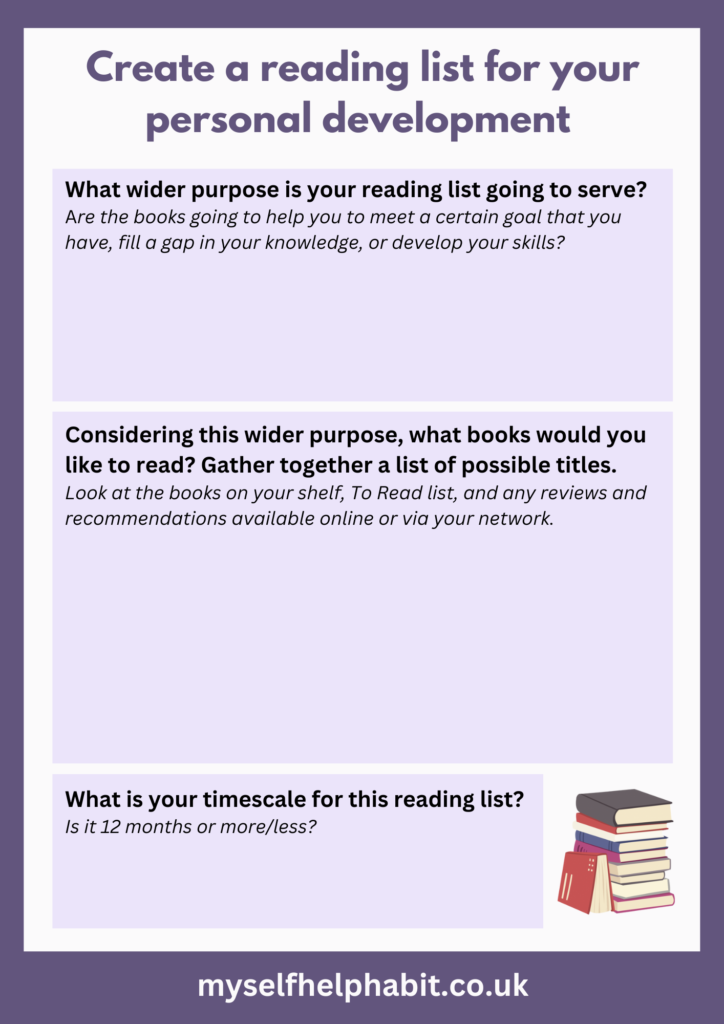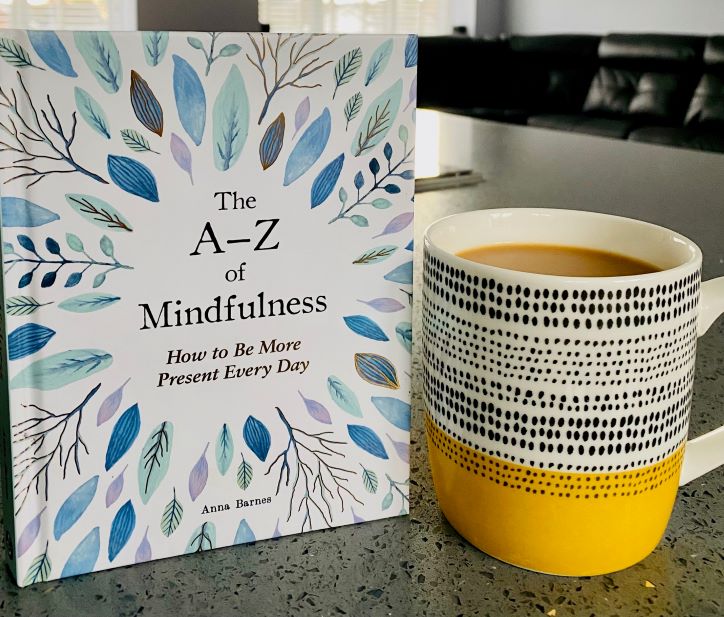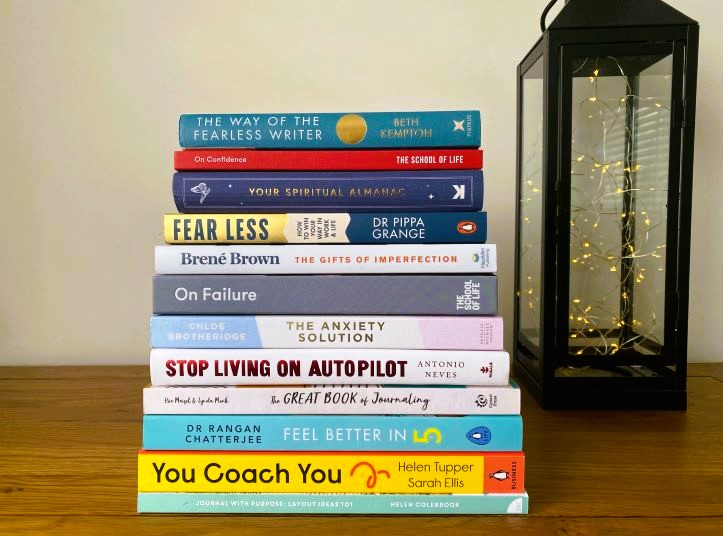
How to create a reading list for your personal development
Are you wondering what personal development books you should read this year?
I’m a self-confessed bookworm and lifelong learner so personal development books are always at the top of my ‘To Read’ list! I love soaking up all the knowledge and wisdom they hold, I relish the self-exploration they encourage, and enjoy learning new, helpful strategies that I can put into practice in my own life.
However, I noticed that I was randomly selecting my reading material and had got into the habit of snapping up the latest personal development books, leaving all of my other books to gather dust and, sadly, demoting them to ‘shelf-help’. I realised that I needed to be more intentional about my choice of reading material and prioritise the books that would support the goals I had set this year.
If you have more books on your shelf or ‘To Read’ list than you know what to do with, or you are new to reading personal development books and don’t know where to start, then setting some intentions and creating a reading list can help to keep you focused on the topics that matter most to your personal development and will guide your reading throughout the year. It also means that you no longer need to mull over what to read next or get drawn into purchasing lots of shiny, new personal development books that just accumulate on your shelf and never get read.
Follow the tips below and download the accompanying guide to help you put together a reading list that you can commit to and that aligns with your personal development goals.
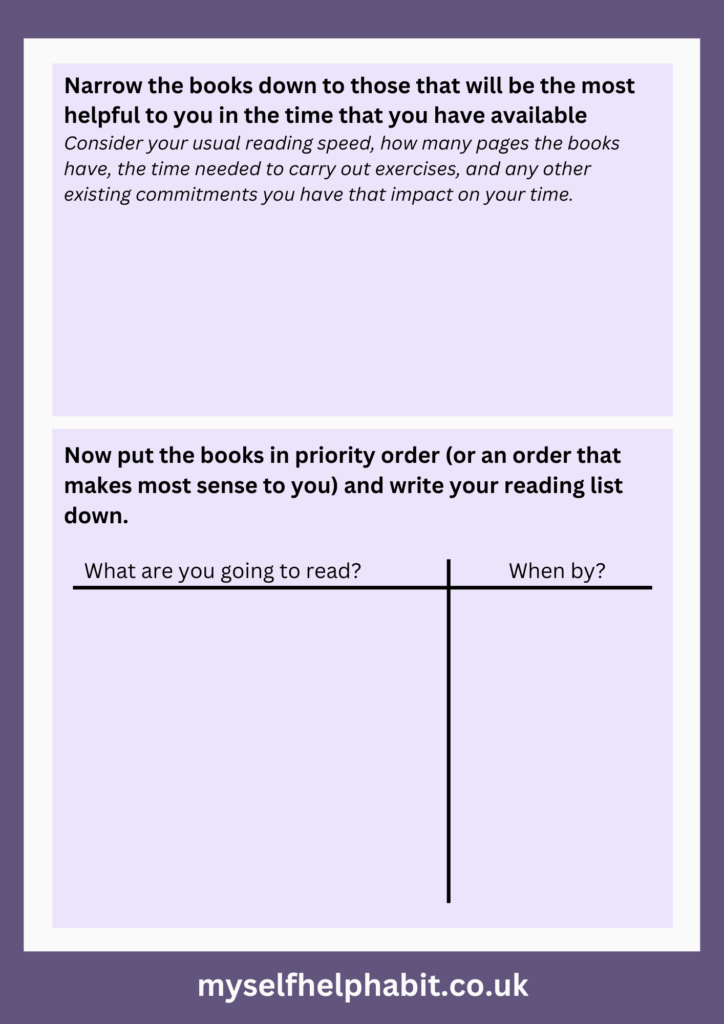
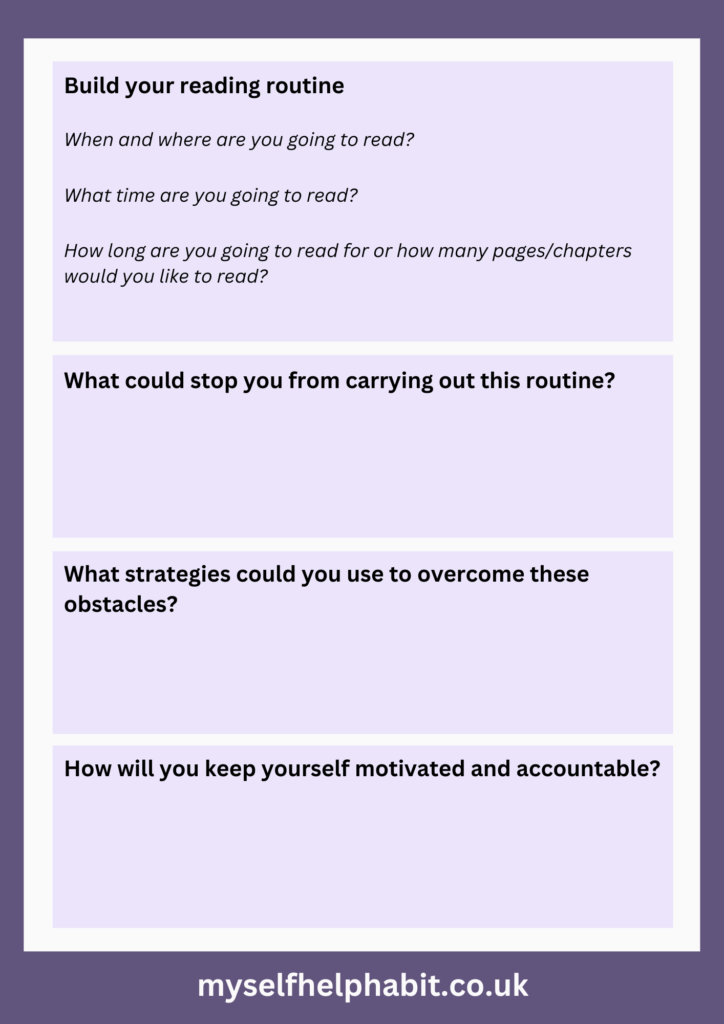
Know your ‘why’!
Before you start noting down a list of titles, stop and think about why it is important that you create this particular reading list and what purpose it is going to serve. Knowing what the bigger picture is can help you to stay motivated when other demands on your time arise and decide what kind of personal development books need to go on your list.
Do you have any goals that you would like to achieve this year? What could you read to help you to achieve these goals?
If you haven’t set any goals this year then consider any reflection you have done recently and what development areas may have surfaced from your reflections. Perhaps you would love to make some positive changes to your life? If so, try completing the Wheel of Life exercise to identify any specific areas that you would like to improve and then think about how reading could help you to get those changes underway.
You could also consider what you would like to learn this year and commit to exploring the topics that you are curious about.
Selecting your personal developments books
Once you know why you want to put a reading list together it is time to start populating your list with books that serve that purpose.
Not sure what books to read or where to start? Here are a few ideas to help you to put together a shortlist:
- What books are already on your shelf? Remind yourself of the reason you bought them and see if they could have a place on your reading list this year!
- What books are on your ‘To Read’ list (if you have one)? Think about why you put them on there and if you need to purchase them for your reading list.
- Are there any personal development books that you have always wanted to read and that keep being recommended to you? Perhaps now is the time to get them on your reading list.
- What type of books or topics have been beneficial to you before? Consider reading similar books or books that cover the same topic but from a different perspective.
- Treat yourself to a trip to your local bookshop or library, go to the topic/section that interests you, and have a browse through the books on the shelves there. The staff may also be able to help you select some reading material.
- Ask family, friends, colleagues, and people in your wider network for recommendations. There may be a relevant Facebook group that you can join (and ask other members for recommendations) or you could search your social media feed for ideas. Instagram, LinkedIn, Twitter and TikTok will probably have hashtags for your topic of interest!
- Google the topic you are interested in and see if any books pop up in the search or are mentioned in articles related to the topic.
- Lots of authors promote their books on podcasts so have a search for podcasts on the topic you are interested in and see if any of the episodes feature book discussions or recommendations.
- Look up reading lists on your topic that have been created on websites (such as Good Reads and The Reading Lists). You can also check out my reading list on Bookshop.org for recommendations and the Book Reviews section of my blog. Disclosure: If you buy books linked to my site, I may earn a commission from Bookshop.org, whose fees support independent bookshops.
Narrow down your selection of books
Depending on what you want to read, there may be lots of books for you to choose from! To narrow your list of books down you could consider:
- Why you selected a particular book (What attracted you to the book? What are you hoping to get from it?)
- What books would help to meet your needs or goals the most? Have a flick through the books if you can or do some more research online by looking at reviews of the books. How likely is it that the book is going to meet your requirements?
- Whether you have a good variety of books on your list to keep you interested and engaged or if some of the books are too similar in content. With this in mind, could you select some different books to give you more variety?
Decide what your timescale is for this reading list and, as much as possible, try to estimate your usual reading speed. Factor in the number of pages your books have and consider the time that you will need to do any exercises in the book. These activities are a really important feature of personal development books and with such action comes the learning and feedback that will help you to make progress and achieve your goals.
While it is good to stretch yourself and have a target to work towards, I would recommend being realistic about how much reading you can get done in the period of time you have otherwise it can quickly become a burden on your already busy routine! For example, is your aim to read a book a month for a whole year realistic given your existing commitments, current daily routine, the length and type of books on your list, and how you like to read?
Organise your reading list
How are you going to decide what to read first?
You might just want to select any book from the list as you go through the year or you may prefer to put them in some kind of priority order.
If you want to organise your list then consider what topics would be most important for you to cover first or would make the biggest difference to your life based on the current challenges that you are facing. You might also have a timescale for reading some of the books on your list, perhaps in line with your goals, which means you need to read some by a certain deadline.
Keep a note of your reading list
Once you have finalised your reading list for the year you will need to find an easy way to refer back to it. You could simply write your list on a piece of paper or in your journal/planner, type it onto a spreadsheet/document, or save it in the notes file on your phone. You can also search for an app or website that allows you to create and maintain book lists (there are many options out there!)
Finding time to read for your personal development
On top of everything else that you have going on in your life, and considering any other reading you might do (such as for work/study, keeping up with current affairs, and for pleasure) you might be wondering – how will I find time to read for my personal development?
If you do not already have a routine for reading for your personal development, I would recommending starting small and setting yourself an achievable daily or weekly target. Make it something that is really easy for you to commit to, it might just be 2-3 pages or 5 minutes a day. You can gradually increase your daily/weekly target once you have found a routine that works for you.
Think about when would be a good time for you to read and then commit to doing some reading at that time. I completed a habit tracker in my journal each day to help me to remember to do this and, using the Tiny Habits method developed by Behaviour Scientist, BJ Fogg, PhD, I ‘piggy backed’ reading for my personal development onto one of my existing daily habits (I started by reading a few pages of my book while having my lunch).
There may be a window of opportunity for you to read a personal development book while you are on the commute, at lunch-time, first thing in the morning (before the demands of the day begin!), or as you are winding down in the evening. You just need to experiment and see what works best for you.
You could even think of the different ways that you could access the book. There may be an audiobook option which would allow you to listen while you are on the go or if you are really stretched for time and just want to get a sense of the book (perhaps before you commit to reading it fully) you could read or listen to a summary of the book (check out Blinkist, Four Minute Books and the Book Insights Podcast for book summaries).
Tips to keep your reading on track!
As well as reminding yourself why you want to read the books on your list (i.e. the wider purpose they serve) and sticking to a regular reading schedule, here are some other actions that you can take to keep yourself on track:
- Set yourself achievable targets and monitor your progress towards them. You could use a habit tracker and give yourself a big tick after you have read a certain number of pages or a chapter each day. You could also give yourself a small reward once you have finished a book (though the value that you get from reading the book will probably be a reward in itself!)
- Make your reading time as pleasurable as possible! Read with your favourite beverage or snack, pick a comfortable location away from noise and distractions (if possible!), and see it as precious time for you and your development!
- Keep yourself accountable by telling people about your reading list and what you are aiming to do. Buddy up with a fellow book lover and meet regularly to discuss what you have read or share your progress with others on your social media accounts (you could even post a quick review of the book).
- Review how you are getting on with your list at certain points in the year (e.g. every 3 months or so). Consider what is working well or not so well and then determine what tweaks need to be made to your list to help you to stay committed to it.
Maintaining a reading list
If a book comes to your attention that isn’t on your reading list for this year, and you really, really can’t wait to read it, and you know that it is relevant to one of your goals, then swap it for a book on your list that is not as important for you to read.
If you find yourself getting tempted away from your reading list every time you come across a new book, and you want to stop your list from becoming too overwhelming, then create a separate ‘master’ or wish list where you can make a note of any other books that come to your attention during the year. If you can, add a note to remind yourself why you want to read the book and arrange the titles into some kind of meaningful order (for example, by a certain topic or theme) so that, when needed, you can quickly find and select the right reading material.
Finally, give your master list a regular audit! Remove the books that you are no longer interested in or that you have now read or purchased.
You are making a wise investment in yourself when you take the time to read for your personal development and implement the life-changing advice and strategies that are contained within these books. Instead of leaving your personal development books to languish on your book shelf, telling yourself that you will read them ‘someday’, put together an intentional reading list and use these books to help you to reach your goals this year!


